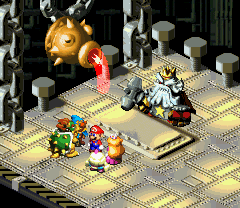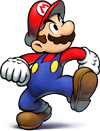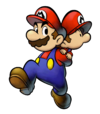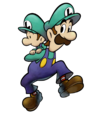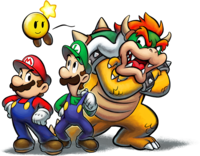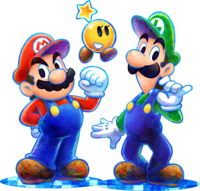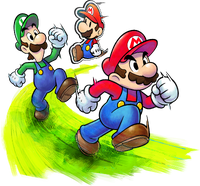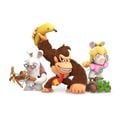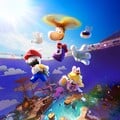Party member
It has been requested that this article be rewritten and expanded to include more information. Reason: add more descriptions of each party member and their abilities
- "Party" redirects here. For other uses, see Party (disambiguation).
Party members, also known as partners or allies, are characters that travel with and battle alongside the protagonist in RPGs. The protagonist and his partners as a group are generally referred to as a party, as the event of a character joining is referred to as said character "joining your party."
Super Mario RPG: Legend of the Seven Stars[edit]
- See also: Super Mario RPG: Legend of the Seven Stars level up progressions
- See also: List of Super Mario RPG: Legend of the Seven Stars special moves
In Super Mario RPG: Legend of the Seven Stars, Mario's party eventually gains five members (including Mario himself), but only three of them can be active at any given time, and Mario must always occupy the first slot. Inactive party members still gain experience and level up after battles.
| Character | Description | Special moves | ||||
|---|---|---|---|---|---|---|
| Level | Move | Description | FP Cost | Magic Power | ||
 Mario |
The main protagonist of the game. He is required to be in the party at all times and always occupies the first slot. He has balanced stats and is the only party member who can use jump and fire attacks. | Start | Jump | "Stomp foes! Press "Y" just before hit!" | 3 | 25 |
| 3 | Fireball | "Fire orb! Push "Y" immediately!" | 5 | 20 | ||
| 6 | Super Jump | "Push "Y" prior to hit for DAMAGE!" | 7 | 45 | ||
| 10 | Super Fireball | "Fire blast! Push "Y" repeatedly!" | 9 | 40 | ||
| 14 | Ultra Jump | "Push "Y" prior to hit for DAMAGE!" | 11 | 65 | ||
| 18 | Ultra Fireball | "Fire orbs! Push "Y" repeatedly!" | 14 | 60 | ||
 Mallow |
A young Nimbus who was raised by Frogfucius and is later revealed to be the prince of Nimbus Land. He joins Mario in Mushroom Kingdom after he agrees to help Mallow catch Croco and get his Frog Coin back. He has high magic stats and is the only party member who can use ice and lightning attacks. | Start | Thunderbolt | "Hit "Y" just before bolt ends!" | 2 | 15 |
| 3 | HP Rain | "HP renewal! Hit "Y" just before shower ends!" | 2 | 10 | ||
| 6 | Thought Peek | "See foe's HP and...secrets!" | 1 | 0 | ||
| 10 | Shocker | "Hit "Y" just before bolt ends!" | 8 | 60 | ||
| 14 | Snowy | "Snowman fells foes!" | 12 | 40 | ||
| 18 | Star Rain | "Star showers! Hit "Y" just upon contact!" | 14 | 55 | ||
 Geno |
An inhabitant of Star Road who was sent to retrieve the Star Pieces, and possesses Gaz's Geno doll for this purpose. He joins the party during the fight with Bowyer. He has high offensive stats and speed. | Start | Geno Beam | "Hold "Y" until just before discharge!" | 3 | 40 |
| 8 | Geno Boost | "Attack up! Push "Y" just before end!" | 4 | 0 | ||
| 11 | Geno Whirl | "Press "Y" prior to contact for critical hit!" | 8 | 45 | ||
| 14 | Geno Blast | "Beam hits all foes! Energize!" | 12 | 50 | ||
| 17 | Geno Flash | "Build power! Beam hits all foes!" | 16 | 60 | ||
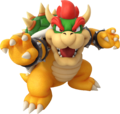 Bowser |
The king of the Koopas. He joins the party when they first reach Booster Tower. He has high HP and physical stats but low magic stats and speed. | Start | Terrorize | "Scare 'em good!" | 6 | 10 |
| 12 | Poison Gas | "Poison foes!" | 10 | 20 | ||
| 15 | Crusher | "Rock slide! Hit "Y" prior to contact!" | 12 | 60 | ||
| 18 | Mechakoopa Stomp | "Bowser's ultimate weapon!" | 16 | 58 | ||
 Peach |
The princess of the Mushroom Kingdom. She joins the party outside of the Mushroom Castle shortly after being rescued from Booster. She has high magic stats and specializes in healing. | Start | Therapy | "Heal HP and status♥" | 2 | 40 |
| Start | Group Hug | "Heal group! HP/status♥" | 4 | 30 | ||
| 11 | Sleepy Time | "Zonk 1 or more foes!" | 4 | 0 | ||
| 13 | Come Back | "Revive one... or more pals!" | 2 | 0 | ||
| 15 | Mute | "Halt magic attack(s)!" | 3 | 0 | ||
| 18 | Psych Bomb | "Make me mad... and BOOM!" | 15 | 60 | ||
Paper Mario series[edit]
Paper Mario[edit]
In Paper Mario for the Nintendo 64, partners are either referred to as Party Members[1] or Mario's Friends.[2] In this game, Mario can only have one Party Member active at a time. Switching Party Members mid-battle uses up Mario's turn unless he is wearing the Quick Change badge. Party Members do not have HP; most enemies' attacks will only target Mario, and the few that can hit Mario's Party Members will simply incapacitate them for a certain number of turns depending on how much damage they took. If the attack is successfully guarded against, the Party Member will take no damage. Party Members can be upgraded with Super Blocks, which increases their attack power and makes them learn new moves. Each Party Member can be upgraded twice, first to Super Rank, then to Ultra Rank. Mario must have the Ultra Stone to upgrade Party Members to Ultra Rank.
| Character | Description | Moveset | ||
|---|---|---|---|---|
| Move | FP | Description | ||
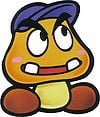 Goombario |
An analytic, knowledgeable and playful young Goomba from Goomba Village who idolizes Mario. He joins Mario after he escorts Goompa back to the village. His out-of-battle ability is to provide information to Mario about nearby characters or the current location. | Headbonk | 0 | "Headbonk an enemy." |
| Tattle | 0 | "See enemies' descriptions and see their HP during battle." | ||
| Charge | 1 | "Charge to raise attack power by 2. You can charge unlimited times, but power fades after attack." | ||
| Multibonk | 3 | "Headbonk continuously until you miss an action command." | ||
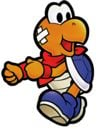 Kooper |
A bold, adventure-loving Koopa Troopa whose shell gets stolen by Fuzzies during an attack on Koopa Village. He joins Mario after he recovers his shell for him. His out-of-battle ability is to retreat into his shell and let it be launched by Mario into distant switches or items to activate or retrieve them, or into foes to attack them and get the First Strike. | Shell Toss | 0 | "Throw a shell at an enemy." |
| Power Shell | 3 | "Throw a shell at all enemies on the ground." | ||
| Dizzy Shell | 4 | "Daze and paralyze all enemies on the ground." | ||
| Fire Shell | 5 | "Attack all enemies on the ground with a flaming shell." | ||
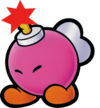 Bombette |
A strong-willed, impatient Bob-omb who used to work at Koopa Bros. Fortress. She was imprisoned in the fortress after she rebelled against the Koopa Bros. She joins Mario after he falls into her cell. Her out-of-battle ability is to briefly walk before exploding, breaking cracked walls and rocks to open up passages, reveal items and activate switches, or get the First Strike on an enemy. | Body Slam | 0 | "Body Slam an enemy." |
| Bomb | 3 | "Explode and destroy an enemy on the ground." | ||
| Power Bomb | 6 | "Explode and destroy all enemies on the ground." | ||
| Mega Bomb | 8 | "Explode and destroy all enemies." | ||
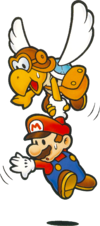 Parakarry |
A bumbling but dutiful Paratroopa mail carrier with a tendency to lose the letters he is delivering. He joins Mario on Mt. Rugged after he retrieves three of the letters Parakarry dropped. His out-of-battle ability is to carry Mario across gaps that Mario cannot jump over. | Sky Dive | 0 | "Kick an enemy." |
| Shell Shot | 3 | "Attack an enemy in the air by bumping into it." | ||
| Air Lift | 3 | "Carry an enemy away from battle. Weaker enemies are more easily carried away." | ||
| Air Raid | 6 | "Fly around like crazy, attacking all enemies." | ||
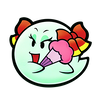 Bow |
The leader of the Boos at Boo's Mansion. After Mario solves her puzzles at the mansion, she requests his help in defeating Tubba Blubba, who had been terrorizing her subjects, and then joins his party. Her out-of-battle ability is to turn Mario and herself invisible to avoid detection and attacks by enemies and moving hazards like popping spikes and Fire Bars, and to become intangible, crossing certain barriers. | Smack | 0 | "Slap an enemy." |
| Outta Sight | 2 | "Make Mario transparent so he can avoid enemy attacks." | ||
| Spook | 3 | "Startle enemies and scare them away from battle." | ||
| Fan Smack | 5 | "Attack an enemy with a fan." | ||
 Watt |
A young, energetic Li'l Sparky who was captured by the Big Lantern Ghost in Shy Guy's Toy Box and used as a power source for his lantern. She joins Mario after he rescues her. Her out-of-battle ability is to light up dark areas and reveal invisible ? Blocks. | Electro Dash | 0 | "Penetrate defense power and attack an enemy with electricity." |
| Power Shock | 2 | "If it works, paralyze an enemy with an electric shock." | ||
| Turbo Charge | 3 | "Electrically boost Mario's attack power for a short time." | ||
| Mega Shock | 5 | "If it works, paralyze all enemies with an electric shock." | ||
 Sushie |
A sensitive yet somewhat grouchy Cheep Cheep from Lavalava Island who often babysits a quintet of Yoshi kids known as the Fearsome 5. She joins Mario in Jade Jungle after he helps her out of a tree. Her out-of-battle ability is to ferry Mario through bodies of water (even being able to briefly dive underwater), but Mario must stand on or be next to a wooden dock to mount or dismount Sushie, respectively. | Belly Flop | 0 | "Flop on an enemy." |
| Squirt | 3 | "Squirt a powerful jet of water. Great for fire enemies." | ||
| Water Block | 3 | "Create a cube of water to boost Mario's defense briefly." | ||
| Tidal Wave | 6 | "Swim madly to create a wave that washes over all enemies." | ||
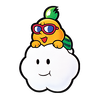 Lakilester |
A tough-guy wannabe Lakitu from Flower Fields who was working for Huff N. Puff. After being defeated, he views Mario as cool and decides to join his party. His out-of-battle ability is to carry Mario on his cloud to quickly move around, and to traverse hazardous surfaces, such as over spikes or lava. | Spiny Flip | 0 | "Throw a spiny egg at an enemy." |
| Spiny Surge | 4 | "Throw spiny eggs at all enemies." | ||
| Cloud Nine | 4 | "Create a cloud to hide Mario for a short time. While in the cloud, Mario will avoid enemy attacks." | ||
| Hurricane | 5 | "If it works, blow the enemies away from battle." | ||
Gallery[edit]
Parakarry joins Mario on Mt. Rugged to find the missing letters.
Watt teams up with Mario in the dark.
Sushie joins Mario in Jade Jungle.
Lakilester decides to join Mario in Flower Fields.
Paper Mario: The Thousand-Year Door[edit]
In Paper Mario: The Thousand-Year Door, Mario's party members are referred to as partners or allies. The party mechanics work like the first Paper Mario, but with a few changes. Partners now have HP and take damage the same way Mario does. Partners are now upgraded by giving Merlon three Shine Sprites. Luigi also gets partners throughout the story: Blooey, Jerry, Torque, Hayzee, and Screamy. However, the player cannot play as them, for Luigi is not a playable character.
| Character | Description | Moveset | ||
|---|---|---|---|---|
| Move | FP | Description | ||
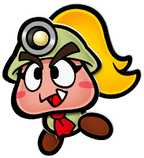 Goombella |
A sassy, peppy, smart Goomba archeology student at the University of Goom. Goombella meets Mario at Rogueport Plaza during the Prologue, and since she is searching for the same legendary treasure as Mario, she decides that it is in their best interests to work together. Goombella has 10 HP initially, 20 at Super Rank, and 30 at Ultra Rank. Her out-of-battle ability, much like Goombario from the original Paper Mario, is to provide information to Mario about nearby characters or the current location. | Headbonk | 0 | Hits enemy twice. Does not work on spiky, fire or electrified enemies. |
| Tattle | 0 | Analyzes enemy and reveals their HP and other statistics. | ||
| Multibonk | 3 | Attacks enemy repeatedly for diminishing damage (minimum 1 per hit). Does not work on spiky, fire or electrified enemies. | ||
| Rally Wink | 4 | Gives Mario a second turn, at the expense of her own turn. | ||
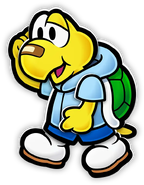 Koops |
A shy Koopa Troopa from Petalburg. Ten years ago, Koops's father left the town to challenge Hooktail residing in Hooktail Castle, but never returned. During the events of Chapter 1, he hears that Mario and Goombella are traveling to Hooktail Castle, so he shakes off his timidness and decides that he wants to join them to overcome his fear. Koops has a Defense Power of 1, but can be knocked on his back like enemy Koopas, this way negating his Defense. He has 10 HP initially, 15 at Super Rank, and 25 at Ultra Rank. His out-of-battle ability, much like Kooper from the original Paper Mario, is to retreat into his shell and let it be launched by Mario into distant switches or items to activate or retrieve them, or into foes to attack them and get the First Strike. Koops can hold his shell in place, unlike Kooper, though. | Shell Toss | 0 | Attacks the frontmost ground-bound or low-hovering enemy. Avoids contact damage from spiky, fire or electrified enemies. |
| Power Shell | 3 | Attacks all ground-bound and low-hovering enemies. Avoids contact damage from spiky, fire or electrified enemies. | ||
| Shell Shield | 4 | Summons a Koopa Shell to protect Mario for a few turns. | ||
| Shell Slam | 6 | Attacks all ground-bound and low-hovering enemies, ignoring their Defense Power. Avoids contact damage from spiky, fire or electrified enemies. | ||
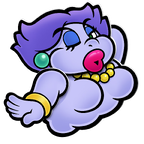 Flurrie |
An affectionate, if slightly pompous and dramatic wind spirit that lives in a house in Boggly Woods. Madame Flurrie is a retired actress, just dreaming of coming out of her hiatus when Mario and friends ask for her help with a small task during the events of Chapter 2. She finds their stories of adventure alluring and decides that she will come with them to help as much as she can. Flurrie has 15 HP initially, 25 at Super Rank, and 35 at Ultra Rank. Since she floats, she is immune to earthquake-type attacks. Her out-of-battle ability is to blow a strong wind current, this way revealing hidden passageways and objects, and briefly stunning enemies (rendering them open to attack). | Body Slam | 0 | Attacks one enemy. Does not work on spiky, fire or electrified enemies. |
| Gale Force | 4 | Blows enemies away from battle. This move is particularly effective against aerial or weak enemies. Also clears fog. | ||
| Lip Lock | 3 | Transfers an enemy's HP to Flurrie's HP. This move pierces Defense Power. Does not work on spiky, fire or electrified enemies. | ||
| Dodgy Fog | 4 | Makes Mario dodgy for a few turns, so that attacks directed at Mario miss more often. | ||
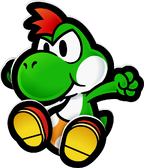 Yoshi Kid |
This spunky, scrappy, competitive baby Yoshi hatches from an egg that Mario found outside the Glitz Pit during Chapter 3, and calls Mario "Gonzales". He can be any one of a variety of colors and the player can name him. He has 10 HP initially, 20 at Super Rank, and 30 at Ultra Rank. His out-of-battle ability is to let Mario ride him to move around much faster and to be able to cross gaps with a Flutter Jump-like technique. | Ground Pound | 0 | Attacks one enemy multiple times for 1 point of damage per hit. Does not work on spiky, fire, or electrified enemies. |
| Gulp | 4 | Swallows an enemy and shoots it at the ground-bound enemy right behind it, damaging both of them. This move ignores Defense Power. | ||
| Mini-Egg | 3 | Throws a set amount of eggs at various random enemies, dealing 1 HP of damage per hit to them. This attack may make them tiny. | ||
| Stampede | 6 | Calls a herd of Yoshis to attack all enemies, no matter their elevation on the battle stage. | ||
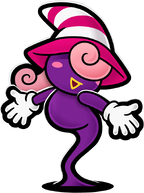 Vivian |
Once a member of the villainous Three Shadows, Vivian shakes off her meekness during Chapter 4, deciding that Mario is much more deserving of her help than her sister Beldam. She has 15 HP initially, 20 at Super Rank, and 30 at Ultra Rank. She is immune to earthquake-type attacks. Her out-of-battle ability, much like Lady Bow from the original Paper Mario, is to hide Mario and herself in the shadows to avoid detection and attacks by enemies and moving hazards like popping spikes and Fire Bars, and to become intangible, crossing certain barriers. | Shade Fist | 0 | Punches an enemy and leaves it magically burned. Does not work on spiky, fire or electrified enemies. The burn will make bomb-type foes explode and defeat themselves instantly. |
| Veil | 1 | Hides Mario and herself in the shadows to negate all damage for a turn. Next turn, Vivian will be unable to act. If Mario acts before Vivian uses this move, he too will be unable to act next turn. | ||
| Fiery Jinx | 6 | Attacks all enemies with fire, penetrating their Defense Power and leaving them burned. This move is particularly effective against ice and undead enemies, and it heals fire foes. The burn will make bomb-type foes explode and defeat themselves instantly. | ||
| Infatuate | 4 | Blows kisses at all enemies, possibly confusing them. | ||
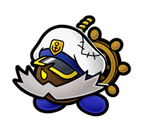 Bobbery |
A stubborn, but noble and jovial, seasoned Bob-omb sailor. Bobbery had refused to go out to sea after a tragedy in his past. Mario must learn his secret to convince him to serve as navigator on a journey to Keelhaul Key, and he joins Mario's party shortly after the ship's crash, in Chapter 5. He has 20 HP initially, 30 at Super Rank, and 40 at Ultra Rank. His Appeal command clears fog in battle. His out-of-battle ability, much like Bombette from the original Paper Mario, is to briefly walk before exploding, breaking cracked walls and rocks to open up passages, reveal items, and activate switches, or to get the First Strike on an enemy. Unlike Bombette, however, he can be thrown by Mario onto high ledges. | Bomb | 0 | Attacks the frontmost ground-bound or low-hovering enemy. This move is particularly effective against fire and undead enemies, but Buzzy Beetles are immune to it. Also flips Clefts, clears fog, and makes bomb and bullet-type foes explode and defeat themselves instantly. |
| Bomb Squad | 3 | Sets up three time bombs to explode on two turns. Where each bomb lands will determine what characters (whether friend or foe) will be damaged, regardless of elevation. This move is particularly effective against fire and undead enemies, but Buzzy Beetles are immune to it. Also flips Clefts and makes bomb and bullet-type foes explode and defeat themselves instantly. | ||
| Hold Fast | 4 | Damages all enemies that make contact with Bobbery. | ||
| Bob-ombast | 9 | Powerfully bombs all enemies. This move is particularly effective against fire and undead enemies, but Buzzy Beetles are immune to it. Also grounds aerial foes, flips Clefts, clears fog, and makes bomb and bullet-type foes explode and defeat themselves instantly. | ||
 Ms. Mowz (optional) |
The Squeek owner of the Lovely Howz of Badges in Rogueport who leads a double life as a dashing, flirty badge thief. Ms. Mowz and Mario cross paths at Hooktail Castle, the Great Boggly Tree, and the Glitz Pit. After Chapter 4 is completed, she leaves a petition at the Trouble Center, asking Mario to find a badge for her. Completion of the petition causes her to join the party. She has 15 HP initially, 20 at Super Rank, and 25 at Ultra Rank. Her out-of-battle ability is to sniff the current area, providing Mario with information about the general whereabouts of any hidden items, badges, or Star Pieces. | Love Slap | 0 | Attacks the frontmost ground-bound or low-hovering enemy, ignoring their Defense Power. Does not work on spiky, fire or electrified enemies. |
| Kiss Thief | 2 | Steals the frontmost ground-bound or low-hovering enemy's held badge or item. | ||
| Tease | 3 | Makes all enemies Dizzy. | ||
| Smooch | 10 | If successful, Mario recovers up to 10 HP. | ||
Gallery[edit]
Super Paper Mario[edit]
Characters[edit]
- Mario - The first of the four Heroes of Light, Mario can Flip between dimensions.
- Princess Peach - Joins Mario when she discovers she is a Hero of Light. She can duck under her parasol, blocking most attacks, and she can also use it to float through the air.
- Bowser - Joins Mario when he is convinced by Peach. He has twice the Attack of Mario, Peach & Luigi and can breathe fire, but he is larger and slower than the others and cannot jump as high. He is also unable to climb ladders.
- Luigi - Joins Mario when found in The Underwhere during Chapter 6's interlude; can jump the highest of all the heroes and can also use his super jump technique to jump even higher and to deal double damage.
Pixls[edit]
- Tippi - Allows the player to Tattle enemies and reveal invisible objects.
- Thoreau - Allows the player to pick up and throw enemies and objects, as well as activate switches.
- Boomer - Acts as an explosive.
- Slim - Allows the player to turn sideways to move through narrow spaces and evade attacks.
- Thudley - Allows the player to perform a Ground Pound.
- Carrie - Can carry the player on a floating platform, allowing them to move faster, bypass spiky floors, and jump on spiked enemies.
- Fleep - Can flip sections of the background, as well as enemies to make them briefly dizzy.
- Cudge - Acts as a Hammer.
- Dottie - Can shrink the player, allowing them to avoid detection by enemies and fit through small doors, pipes, and passages.
- Barry (Optional - Unlocked by completing Chapter 3 and returning to the start of it and speaking to him) - Projects a barrier around the player.
- Dashell (Optional - Unlocked by completing Flipside Pit of 100 Trials) - Increases the characters' speeds.
- Piccolo (Optional - Unlocked by completing a long list of errands involving Merlee, Merluvlee, Bestovius, Old Man Watchitt and Merlumina) - Can use music to heal status ailments.
- Tiptron (Optional - Sold by Francis after Chapter 8's completion for 999 coins) - Replaces Tippi after beating the game.
Paper Mario: Color Splash[edit]
Like Paper Mario: Sticker Star, Paper Mario: Color Splash does not have proper party members. However, this game introduces a similar game mechanic in the form of the Enemy Cards. Upon defeating an enemy, there is a chance that it might drop a copy of itself as an Enemy Card, that the player can then put into their deck and summon in future battles in front of Mario. Enemies summoned from Enemy Cards perform a specific action each turn until they are defeated, or another Enemy Card is used, replacing the one currently in place. They only last until the end of the specific fight they are summoned into, and do not carry over to the next ones. If Enemy Cards are used during boss battles, the summoned enemy runs away instead. There are 72 Enemy Cards in total, including the recolored enemies and boss characters.
Paper Mario: The Origami King[edit]
In Paper Mario: The Origami King all party members are temporary, only accompanying Mario for specific periods of time or in specific streamer districts. Party members only have one attack in battle and attack automatically after Mario moves, although their attacks sometimes fail. The player can equip the Ally Tambourine accessory to improve the partners' attacks by 50%; Spike and Bone Goomba can never benefit from this bonus, as they become unavailable before the player acquires the Ally Tambourine.
| Character | Move | Attack power (Normal/Ally Tambourine) | Attack range | Availability |
|---|---|---|---|---|
Bob-omb |
Bomb Bump | 20/30 | One enemy | After boarding the cable car to Autumn Mountain until his sacrifice in Sweetpaper Valley. Unavailable in the Earth Vellumental Temple, Water Vellumental Shrine, Ninja Attraction, and Scuffle Island. |
Spike |
Up-Chuck | 25 | Line formation | After being found in the grassy field in Autumn Mountain, until being brought to the "canned-food par-tay". |
Bone Goomba |
Skullbonk | 20 | One enemy | After being found in the grassy field in Autumn Mountain, until being brought to the "canned-food par-tay". |
Professor Toad |
Dig This | 24/36 | Up to four enemies in any formation | After defeating Mega Paper Macho Pokey, permanently available in all locations of the yellow streamer area excluding Sweetpaper Valley, Breezy Tunnel, and the Fire Vellumental Cave. |
Kamek |
Magic | 38/57 | Up to four enemies in any formation | After meeting him in Shangri-Spa, until vanishing in Bowser's Castle. Cannot be taken outside of the green streamer area. Unavailable in the Spring of Jungle Mist and Spring of Rainbows after Bowser Jr. is restored in the latter. Briefly available in Hotfoot Crater until he attempts to stop the Paper Macho Mini Goomba horde. |
Bowser Jr. |
Tantrum | 50/75 | Line formation | After being restored in the Spring of Rainbows, until arriving in the great hall of Bowser's Castle. Cannot be taken outside of the green streamer area. Unavailable in the Spring of Jungle Mist and Spring of Rainbows. Briefly available in Hotfoot Crater until he attempts to stop the Paper Macho Mini Goomba horde. |
Bowser |
Fire Breath | 50/75 (Fire) | Line formation | After being saved in Peach's Castle until escaping the castle, available again in Peach's Castle/Origami Castle after escaping from Hotfoot Crater. Only available in the last two rooms of the castle after being unfolded. |
Mario & Luigi series[edit]
Throughout the Mario & Luigi series, both Mario and Luigi are always present as the main party members. These games have a unique control scheme where the button controls Mario's actions and the
button controls Luigi's actions. Mario starts each game with higher Power, Speed, and Bros. Points, while Luigi has higher Defense, Stache, and HP. This pattern holds when the Bros. level up, but the player can choose to increase stats in ways that break this pattern.
In the field, the Mario Brothers move together, with Luigi trailing behind Mario. If Luigi is caught on a wall, then they cannot move. In other words, the two characters cannot be separated horizontally. They can both jump, with coordinated jumping being the only way to advance given Luigi's movement restrictions. Only Mario can hit M Blocks to receive their items or coins, and the same is true for Luigi and L Blocks. Early in each game, both characters receive Hammers to swing and break objects though Luigi's hammer is less useful as an attack than Mario's because Luigi does not reach over Mario. If the Bros are next to each other, they can use Bros. Moves. These are special techniques that allow them to get past various obstacles. Some of these moves allow one character to enter a separate area. However, usually there are no enemies to battle in such areas.
In battle, Mario and Luigi usually have identical standard attacks: a jump attack and a hammer attack. However, the two learn or obtain different Bros. Attacks. These are combination attacks involving both brothers. While both characters are involved in the attack, only one character can select the attack from the menu.
If either Mario or Luigi are defeated, the surviving Bro will carry the other during enemy turns. This makes the jump counterattack take longer to perform and increases the time it takes to ready the hammer for the hammer counterattack. Additionally, they can no longer use Bros. Attacks. Defeated characters do not gain experience points for enemies battled before they were knocked out. However, when they return to the field a defeated brother is restored to 1 HP.
At the start of the tutorial for each game, Mario explores on his own. He is the sole player character until Luigi joins him later in the tutorial. Some games have portions where Mario is absent, leaving Luigi as the only player character until Mario returns.
There are a few occasions where some characters may join as temporary party members during battle that cannot be controlled by the player. Some games have an additional party member that joins the protagonists, usually controlled with different buttons and having new attacks to use.
Mario & Luigi: Superstar Saga/Mario & Luigi: Superstar Saga + Bowser's Minions[edit]
The first game in the series, Mario & Luigi: Superstar Saga, establishes all of the above principles. However, there are some elements unique to it. Each brother gains a unique Hand Power as a move in the field and as an attack: Firebrand for Mario and Thunderhand for Luigi. The order of the brothers can be swapped, which allows Luigi to hit things in front of the duo with his attacks. Additionally, the Bros. Actions the team can perform depend on the current order. The brothers can be separated through certain Bros. Actions, and they can enter battles while separated. Doing so means the other brother does not participate in the battle.
The character's stats are also different. Mario starts the game with higher stats in Power, Speed, and Stache, while Luigi starts the game with higher HP. Their Defense and Bros. Points are equal. This pattern does not hold as the Bros. level up, with Luigi having the most Bros. Points, Defense, and Stache if both characters reach Level 99.
The remake of the game, Mario & Luigi: Superstar Saga + Bowser's Minions, removes the ability to freely swap the order of the Mario Brothers. The brothers only switch positions as part of Bros. Actions.
Mario & Luigi: Partners in Time[edit]
Baby Mario and Baby Luigi join as party members for the entirety of Mario & Luigi: Partners in Time after teaming up with their adult selves, who have been defeated earlier by the Shroobs in Hollijolli Village. Baby Mario uses the ![]() button and Baby Luigi uses the
button and Baby Luigi uses the ![]() button. Baby Mario and Baby Luigi start the game with lower versions of their respective adults' stat distributions. However, as they level up, Baby Mario and Baby Luigi surpass their elders in Defense and Speed.
button. Baby Mario and Baby Luigi start the game with lower versions of their respective adults' stat distributions. However, as they level up, Baby Mario and Baby Luigi surpass their elders in Defense and Speed.
In this game, all four members can travel together, with the babies being carried by the adult brothers in Piggyback Mode. They can also split up by using Baby Toss to throw the babies forward. This allows the team to travel as two parties of two, with Mario and Luigi as a pair and Baby Mario and Baby Luigi as the other pair. The pairs can only use Bros. Actions while separated, and both pairs have different Bros. Actions. If the babies take a separate path from the adults, then the babies' field gameplay is displayed on the Top Screen while the adults use the bottom screen. Both groups can be swapped between by pressing a button for the other group, and the adults can walk into the babies to pick them up again.
Each pair has their own unique abilities aside from the Bros. Actions. Mario and Luigi can jump higher,[3] but only Baby Mario and Baby Luigi receive Hammers in this game, meaning only they can break objects and push buttons. M Blocks and L Blocks can be hit by Baby Mario and Baby Luigi, respectively. Some objects, such as Trampolines, only have a useful effect when the babies use them.
In battle, Baby Mario and Baby Luigi fight identically to their adult selves, with the Hammer action being exclusive to the babies. All four members fight together if they enter battle together with Baby Mario and Baby Luigi remaining on piggyback. The babies do not take turns as long as their respective adult is not KO'd, but they also do not take damage. The babies help in battle by adding new Action Commands to the adults' attacks and using the hammers for the adults. This game uses Bros. Items in place of Bros. Attacks. None of them are exclusive to any character, but some require at least two characters to be in play to use while others require all four. If an adult is KO'd while the babies are present, their Baby counterpart takes their place in battle so the adult does not have to be carried. If that baby is KO'd, then the other set of characters have to carry them. If all members of one party are KO'd, then a Game Over occurs. This happens even if the babies and adults are traveling separately.
Mario & Luigi: Bowser's Inside Story / Mario & Luigi: Bowser's Inside Story + Bowser Jr.'s Journey[edit]
In Mario & Luigi: Bowser's Inside Story and its Nintendo 3DS remake, Bowser becomes a party member and main protagonist of the story, taking part in almost the majority of the game's plot while Mario and Luigi assist him from inside Bowser's body. Bowser's controls are mapped to ![]() and
and ![]() (
( and
in the 3DS remake). The player can press
![]() or
or ![]() (
( only in the 3DS remake) while in control of Mario and Luigi to switch to Bowser's gameplay and take control of him.
Bowser is unable to jump. He has different field moves like the sliding haymaker and the Body Slam which he uses to navigate the game's world. In battle, he can punch and use his fire breath to attack enemies. He can use the Vacuum command with the Vacuum Block to inhale items, small enemies for Mario and Luigi to battle inside his body, as well as retrieve various Blitties throughout the game. Bowser uses Brawl Attacks, which involve the minions he rescues during the game. When being attacked, Bowser can counterattack by punching or retreating into his shell.
In this game, both Mario and Luigi can initiate all of the game's Bros. Attacks.
Mario & Luigi: Dream Team[edit]
In Mario & Luigi: Dream Team, Mario and Luigi's adventure is normal in the real world. However, Luigi has to fall asleep for Mario to enter the Dream World. While in the Dream World, Mario is instead accompanied by Dreamy Luigi, who acts using the button as Luigi does. He also shares Luigi's stats and gear, so there is not a separate space in the menu for Dreamy Luigi.
Dreamy Luigi does not use the duo's Bros. Moves, nor can he use the hammer in the field. Instead, Dreamy Luigi can enter and use Luiginary Works. These are used by having Starlow interact with the sleeping Luigi in the real world, and can have dramatic effects on the environment in the Dream World. One Luiginary Work, the Luiginoid Formation, involves summoning Luiginoids to form one of three shapes. Each of these shapes has their own field moves. Dreamy Luigi can hit L Blocks.
In battle, Dreamy Luigi is not a true party member. Dreamy Luigi "zooms" into Mario for most of the battles in the Dream World. His presence multiplies Mario's HP by by 1.5 and his BP by 1.2. In this state, Dreamy Luigi does not take his own turns, nor can he be targeted by enemies or take damage. (The game does not display Dreamy Luigi's HP and BP.) As such, Mario's HP reaching 0 in the Dream World results in a Game Over.
Dreamy Luigi still deals damage during the battle. He enhances Mario's solo jump and hammer attacks by having Luiginoids attack multiple enemies. Dreamy Luigi allows Mario to use Luiginary Attacks, which are special attacks involving the Luiginoids. Luiginary Attacks fill Luigi's side of the Badge Meter, and certain ones have Dreamy Luigi inflict the damage. If Dreamy Luigi wears gear that damages the wearer, Mario takes the damage.
Two boss battles have party members temporarily join Mario and Luigi, but they cannot be controlled by the player at all. Popple is present during the boss battle against Wiggler, but his actions are harmful to the player. For example, he can latch on to one of the Bros, slowing their counterattack down similarly to how carrying a defeated character functions. Popple can be attacked during this battle, which sometimes prevents him from acting for a certain number of turns. After Wiggler is beaten, Popple turns on the Bros. and fights them himself. While Prince Dreambert normally helps the Mario Bros. outside of battle, he joins them in battle during the final battle with Antasma in the Dream World. Prince Dreambert heals Mario 30 HP at the start of Mario's attacking turns and when Antasma causes Mario to fall asleep before starting one of his special attacks.
Mario & Luigi: Paper Jam[edit]
In Mario & Luigi: Paper Jam, Paper Mario joins as the third party member for the rest of the game after floating in to fight when Mario and Luigi are initially done in by the Goomba Wheel at the beginning of the story. Paper Mario's stats generally make him a more extreme version of Mario, with stronger offensive stats but worse defensive stats. He has more Bros. Points and Speed than Mario does, but has less HP. His Stache falls in the middle between Mario and Luigi. His Defense starts as just one point behind Luigi and his Power starts as just one point behind Mario, but both trail off to be between the other brothers as everyone levels up.
In battle, he can create copies of himself using the Copy Block to protect from direct hits as much as possible, as well as increase attack power. Paper Mario can also hover and swing several hammers with his copies during enemy turns to easily dodge and counter against attacks. He is also the only party member capable of using Trio Attacks, which are special attacks involving all three characters. As with Bros. Attacks, if any member of the party is knocked out, Trio Attacks cannot be used. Bros. Moves do not appear in this game. Instead, the party uses Trio Moves in the field gameplay, to similar effect. Only Paper Mario can hit P Blocks.
All three characters start the game with Hammers.
In the Bad Nabbit mission, Nabbit can assist the party in the even-numbered phases against various enemies as a temporary party member, but he cannot be controlled by the player. He can jump on a random enemy, toss three Mushrooms to heal the entire party for 60 HP, and can team up with either Mario or Luigi to kick a Buzzy Shell similarly to the 3D Red Shell Bros. Attack.
Mario & Luigi: Brothership[edit]
Mario and Luigi are the only playable party members in Mario & Luigi: Brothership.
Mario + Rabbids series[edit]
In the Mario + Rabbids games, the player usually controls a party of three characters during the battles, out of a selection of playable characters that are progressively unlocked throughout the game. During the overworld segments, the player controls Beep-0 instead, who is followed by the three selected party members.
Mario + Rabbids Kingdom Battle[edit]
In Mario + Rabbids Kingdom Battle, Mario is required to be present in the party at all times, similarly to Super Mario RPG. Likewise, at least one Rabbid character is required to be in the party.
The DLC campaign Donkey Kong Adventure features a different set of playable characters instead, with Rabbid Peach returning alongside newcomers Donkey Kong and Rabbid Cranky. The player still controls Beep-0 in the overworld sections, this time ridden by Rabbid Cranky.
Gallery[edit]
Mario + Rabbids Sparks of Hope[edit]
In Mario + Rabbids Sparks of Hope, the party does not have the same limitations as the previous game: Mario is not required to always be selected, nor do Rabbid characters. Several Darkmess Puddle battles use a party of two characters who are both required to use, and several boss battles use a fourth locked party member. The roster also includes new characters who, unlike the previous game, are not exclusively pairs of characters from the Super Mario franchise and their Rabbid counterparts.
Similarly to the Donkey Kong Adventure from the previous game, a separate DLC campaign titled Rayman in the Phantom Show features returning Rabbid Peach and Rabbid Mario alongside newcomer Rayman.
Gallery[edit]
Names in other languages[edit]
| Language | Name | Meaning | Notes |
|---|---|---|---|
| Japanese | なかま[?] Nakama |
Ally | |
| Chinese (simplified) | 伙伴[?] Huǒbàn |
Partner | |
| Chinese (traditional) | 同伴[?] Tóngbàn |
Ally | |
| Dutch | groepslid[?] | group-member | |
| Partner[?] | - | The Thousand-Year Door remake | |
| French | allié[?] | ally | |
| German | Kämpfer[?] | Fighter | |
| Italian | membro[?] | member | |
| Compagno (Paper Mario series)[?] | Partner | ||
| Korean | 동료[?] Dongryo |
Buddy | |
| Spanish | Compañero[?] | Partner | |
| Aliado (Super Mario RPG)[?] | Ally |
Trivia[edit]
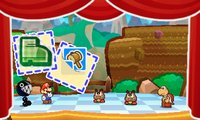
- All female partners in Paper Mario: The Thousand-Year Door kiss Mario at some point before joining his party.
- While Paper Mario: Sticker Star does not feature playable partners, early promotional footage shows that an unnamed Chain Chomp was at one point considered as a party member. Similarly to Kooper and Koops, it would have been able to hit items from afar in the overworld.[4]
See also[edit]
References[edit]
- ^ Paper Mario instruction manual. Pages 15, 21, 23, 24, and 26. nintendo.com. Retrieved May 7, 2021.
- ^ Paper Mario instruction manual. Page 7. nintendo.com. Retrieved May 7, 2021.
- ^ "The adult Bros. can jump higher than their diminutive counterparts." – 2006. Mario & Luigi: Partners in Time instruction booklet. Nintendo of Europe (en-eu). Page 15.
- ^ Paper Mario 3DS beta trailer (E3 2010)
